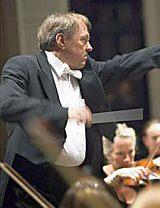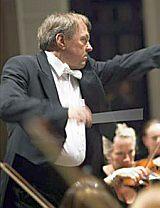
Weil has long bridled under the obligation to serve the Festival’s namesake, favoring (whenever possible) Haydn, Mozart, and Beethoven. For the past several seasons, Festival management has even acknowledged this in its publicity, referring to the “Carmel Bach and beyond Festival.” With new management in place since the end of the 2008 Festival, the “and beyond” was dropped, but Weil, if anything, further reduced his commitment to the old wig. This summer he conducts only three cantatas from the Christmas Oratorio, surrounded by plenty of Beethoven, some Brahms and Mendelssohn, and Haydn’s late oratorio The Creation, heard last Friday at Carmel’s Sunset Center.
While Weil’s taste for the classical style may not be hard to understand, his way with words set to music is. He gets especially cooked up by those scenes that offer orchestra display — the bigger, the better. But that heat quickly cools with whatever comes in between, even while his stable of solo singers, well-prepared chorus, and expert instrumentalists carries his water graciously and with polish.
Dismayingly Orderly ‘Chaos’
This Creation left more questions than answers, especially coming from a man who takes pride in (and is well-known for) his Haydn. The opening-night performance glossed over so many of the great score’s treasures as to leave me wondering if this was really the same piece listed in the printed program. From the opening “Representation of Chaos” to the final chorus, the whole performed without break in one 90-minute straight shot, Weil came in a full 24 minutes shorter than Herbert von Karajan’s Vienna Philharmonic recording from the 1982 Salzburg Festival, and 14 minutes under Leonard Bernstein’s New York Philharmonic recording.
The “Chaos” by itself lasted a mere five minutes, giving up almost entirely its, well, chaos. Instead, an orderly, deliberate reading aroused neither mystery nor mystique. The ensuing “Let there be light” was done with comparable efficiency and, lacking any sense of wonder, made no memorable impact. Much the same could be said for the chorus that closes Part I, “The heavens are telling the Glory of God,” though the path there enjoyed fine and detailed efforts from soloists, chorus, and orchestra alike.
It is well-known that Haydn was smitten by the grand London productions he heard of Handel’s Israel in Egypt and Messiah. His earlier familiarity with Handel’s oratorios “on paper” did not prepare him for their dramatic impact and Baroque grandeur, and he said as much at the time, even musing to some how inspired he felt about breathing up-to-date life into the old forms. This history, along with the Bach Festival’s world-class resources, makes Weil’s performance all the more puzzling.
Puzzling, that is, until a listener recalls that Weil’s response to Bach has rarely started with an embrace of the words. It’s this that accounts for his unpredictable and inconsistent productions over the last 17 seasons of the Mass in B Minor, the “St. Matthew” and “St. John” Passions, and the cantatas that use a large orchestra. It’s as though Weil thinks of Bach’s large sacred works as symphonic pieces, wherein the words can take care of themselves.
Of course, that is very far from Bach’s own understanding of what he was doing. And likewise the Haydn of The Creation. To skate across the “Chaos” without lingering on its weird harmonic implications and false cadences seems like a complete misunderstanding of the composer’s expressive intension.
Loving Solo Singing
Haydn was never an artist to wear his heart on his sleeve. Yet he did understand how to write a love scene; witness the Adam and Eve duet in Part III. Their amazement at God’s work, “so great, so wonderful,” is phrased with unguarded melodic joy, one of those moments to be heard over and over in the mind’s ear long after the performance has ended. But not here. In spite of soprano Kendra Colton’s and baritone Sanford Sylvan’s attempts to make good on that promise, Weil just motored on through.
Luckily for the audience, Colton, Sylvan, and tenor Alan Bennett held up their parts with class and excellence — though Sylvan’s range of his vocal colors and personal expressiveness put him in a class of his own. Andrew McGill’s Festival Chorus sounded well-prepared but, with the limited space allowed by Weil’s chugging tempos, didn‘t make its customary impact.
With Gottfried van Swieten’s vivid libretto, fashioned from Genesis and Milton’s Paradise Lost, Haydn worked to a fever pitch; the work is crammed with tone-painting, mystery, humor, affection, and convincing faith. Those few of us who happened to hear it in last spring’s Santa Cruz County Symphony performance under John Larry Grainger have that fine reading with which to recall our own faith in The Creation.

